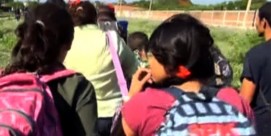BOB ABERNETHY, anchor: Our managing editor Kim Lawton and I want to talk about the multiple challenges of the immigrant surge. Kim, there are about 50,000 or so of these kids from Central America who have come in across the border this year. And they've overwhelmed the system that's supposed to give them court hearings and have a judge decide what happens to them. The president is asking Congress for $3.7 billion to try to do something about the problem, but Congress is about to go on vacation. What are religious leaders saying about what they think should happen now? What do they want?
KIM LAWTON, managing editor: Well, of course they want to see the children cared for in the short term, that's one thing. They're also very actively lobbying for changes in the policy. Some want to see changes so the system can be streamlined so these kids aren't just waiting. Some are petitioning that the kids aren't sent back. The Catholic bishops had a really strong statement saying, “Don't send the kids back, that would be, morally wrong to send them back to dangerous situations.” Others in the religious community are saying, “Yes, it's a matter of law and order. Send them back to their 'loving families.'” So it's very complicated and there's a lot of religious activity.
ABERNETHY: And what are they saying about foreign aid to try to solve these problems at their source?
LAWTON: Well, there has been, there have been a lot of calls, especially this week, from the religious community to say, in addition to dealing with the most immediate crisis that we have now, we need to look at what's going on in the home countries. How can we improve the social fabric of these places? How can we, enhance development so that the people don't want to leave?
ABERNETHY: And something not talked about very much is that some of these problems, the violence and the corruption, are in part caused by the drug war which the demand for drugs in the United States helps fuel.
LAWTON: Exactly. Corruption, organized crime, the drug activity. All of those things, religious groups have been saying, we need to look at those issues so that the kids can want to stay. You know, their parents want them to stay with their families.
ABERNETHY: Well, what do you say to somebody, maybe your neighbor, who says with great feeling, and we heard some of this in Saul's piece, say to them, people who say, “We just don't want any of these kids in our neighborhood. Not in my backyard.” And even this past week people have been saying when some of the government wanted to come in and perhaps house some of the kids, they're saying no.
LAWTON: Well, and some of that's economic, it's not just, you know, some people say, “Oh, that's all racism.” For some of these people it is economic questions about who pays for this. We were already in a budget crisis, how do we, you know, morally allocate our resources? We did hear a lot from the religious community, those saying we need to respond in compassion, especially for the kids. And we need to watch out for anything that is not compassionate. And so you even saw among religious conservatives there was a strong statement from Russell Moore, a Southern Baptist leader who's politically conservative, urging his people, you know, the Gospel, he said, doesn't give us details about how to keep the border safe and have a just immigration policy. He said, but it does tell us we can't respond in what he said was “anger and disgust.”
ABERNETHY: Kim Lawton, many thanks.


